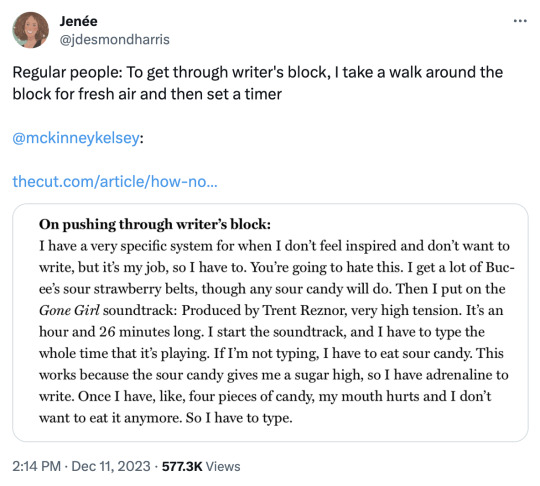A separate writing blog for another-shameless-fangirl mostly for Danny Phantom but likely others. Follow for my writing and writing related posts
Last active 3 hours ago
Don't wanna be here? Send us removal request.
Note
Do you think people who are virgin should write smut? I feel like most of them don’t even know what they’re writing and just write what they think sex is
the implication this ask suggests that people who write about murders, cannibalism, politics, magic, royalty au, sci-fi, wars, supernatural, time travel, medieval era, werewolves, vampires, mermaids or goblins must be murderers, cannibals, presidents, wizards, royalties, astronauts, ghost hunters, soldiers, time travelers, knights, werewolves, vampires, mermaids or goblins in real life is so funny to me
26K notes
·
View notes
Text
Apparently a lot of people get dialogue punctuation wrong despite having an otherwise solid grasp of grammar, possibly because they’re used to writing essays rather than prose. I don’t wanna be the asshole who complains about writing errors and then doesn’t offer to help, so here are the basics summarized as simply as I could manage on my phone (“dialogue tag” just refers to phrases like “he said,” “she whispered,” “they asked”):
“For most dialogue, use a comma after the sentence and don’t capitalize the next word after the quotation mark,” she said.
“But what if you’re using a question mark rather than a period?” they asked.
“When using a dialogue tag, you never capitalize the word after the quotation mark unless it’s a proper noun!” she snapped.
“When breaking up a single sentence with a dialogue tag,” she said, “use commas.”
“This is a single sentence,” she said. “Now, this is a second stand-alone sentence, so there’s no comma after ‘she said.’”
“There’s no dialogue tag after this sentence, so end it with a period rather than a comma.” She frowned, suddenly concerned that the entire post was as unasked for as it was sanctimonious.
123K notes
·
View notes
Text
yeah dat guy's gonna be sleeping with da fishes. *i show him to my guest room where I keep my 46 gallon aquarium with numerous guppies.* sleep tight pal
2K notes
·
View notes
Text
Resources For Writing Sketchy Topics
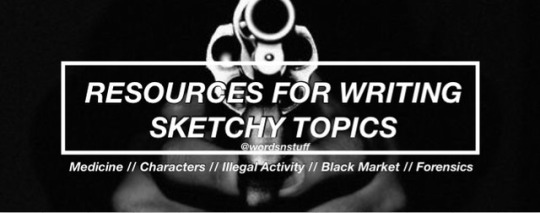
Medicine
A Study In Physical Injury
Comas
Medical Facts And Tips For Your Writing Needs
Broken Bones
Burns
Unconsciousness & Head Trauma
Blood Loss
Stab Wounds
Pain & Shock
All About Mechanical Injuries (Injuries Caused By Violence)
Writing Specific Characters
Portraying a kleptomaniac.
Playing a character with cancer.
How to portray a power driven character.
Playing the manipulative character.
Portraying a character with borderline personality disorder.
Playing a character with Orthorexia Nervosa.
Writing a character who lost someone important.
Playing the bullies.
Portraying the drug dealer.
Playing a rebellious character.
How to portray a sociopath.
How to write characters with PTSD.
Playing characters with memory loss.
Playing a pyromaniac.
How to write a mute character.
How to write a character with an OCD.
How to play a stoner.
Playing a character with an eating disorder.
Portraying a character who is anti-social.
Portraying a character who is depressed.
How to portray someone with dyslexia.
How to portray a character with bipolar disorder.
Portraying a character with severe depression.
How to play a serial killer.
Writing insane characters.
Playing a character under the influence of marijuana.
Tips on writing a drug addict.
How to write a character with HPD.
Writing a character with Nymphomania.
Writing a character with schizophrenia.
Writing a character with Dissociative Identity Disorder.
Writing a character with depression.
Writing a character who suffers from night terrors.
Writing a character with paranoid personality disorder.
How to play a victim of rape.
How to play a mentally ill/insane character.
Writing a character who self-harms.
Writing a character who is high on amphetamines.
How to play the stalker.
How to portray a character high on cocaine.
Playing a character with ADHD.
How to play a sexual assault victim.
Writing a compulsive gambler.
Playing a character who is faking a disorder.
Playing a prisoner.
Portraying an emotionally detached character.
How to play a character with social anxiety.
Portraying a character who is high.
Portraying characters who have secrets.
Portraying a recovering alcoholic.
Portraying a sex addict.
How to play someone creepy.
Portraying sexually/emotionally abused characters.
Playing a character under the influence of drugs.
Playing a character who struggles with Bulimia.
Illegal Activity
Examining Mob Mentality
How Street Gangs Work
Domestic Abuse
Torture
Assault
Murder
Terrorism
Internet Fraud
Cyberwarfare
Computer Viruses
Corporate Crime
Political Corruption
Drug Trafficking
Human Trafficking
Sex Trafficking
Illegal Immigration
Contemporary Slavery
Black Market Prices & Profits
AK-47 prices on the black market
Bribes
Computer Hackers and Online Fraud
Contract Killing
Exotic Animals
Fake Diplomas
Fake ID Cards, Passports and Other Identity Documents
Human Smuggling Fees
Human Traffickers Prices
Kidney and Organ Trafficking Prices
Prostitution Prices
Cocaine Prices
Ecstasy Pills Prices
Heroin Prices
Marijuana Prices
Meth Prices
Earnings From Illegal Jobs
Countries In Order Of Largest To Smallest Risk
Forensics
arson
Asphyxia
Blood Analysis
Book Review
Cause & Manner of Death
Chemistry/Physics
Computers/Cell Phones/Electronics
Cool & Odd-Mostly Odd
Corpse Identification
Corpse Location
Crime and Science Radio
crime lab
Crime Scene
Cults and Religions
DNA
Document Examination
Fingerprints/Patterned Evidence
Firearms Analysis
Forensic Anthropology
Forensic Art
Forensic Dentistry
Forensic History
Forensic Psychiatry
General Forensics
Guest Blogger
High Tech Forensics
Interesting Cases
Interesting Places
Interviews
Medical History
Medical Issues
Misc
Multiple Murderers
On This Day
Poisons & Drugs
Police Procedure
Q&A
serial killers
Space Program
Stupid Criminals
Theft
Time of Death
Toxicology
Trauma
296K notes
·
View notes
Text
So You Want To Make a Character..
I’ve got a few generators you can use.
Need some clothes?
Try Here Here or Here Definitely here Steam punk clothing Char Style preference Dress
Need an Appearance idea?
Humanoid generator? check Non-Humanoid? Got that too and this and maybe this Need Monsterpeople? I’ve got you. Maybe you need Cats?
Need some details and shit like that?
Bam Backgrounds and stuff? yep Personality. you need that shit Need something fandom related? World-building? location? got ya City generator hell yeah make your own god damn laws Oh shit someone died Landscape. CHAR DEVELOP QUESTION GEN Profile Thingy Have some dates Quirks
You thought I was done? Nope. Motha. Fuckin. Names.
So many fuckin names MOTHERLOAD OF NAMES
Plant Names Magic Book title
Just search ur ass up some names man
Items. Yeah. You heard me.
Medicine? got it Items out the ass more items wow
Other shit.
Wow Yep Plots More writing stuff This site has everything so fucking go for it Need AUs? How the shit did these two meet? Fanfic plots. you bet your ass. (tag me in the shit u write i wanna see what you get) What does it do thing (you come up with a better name for this one. fuckin fight me.
You bet your ass I will continue to update this. If you’ve got something I should add to this hmu. Now, go forth! Make characters and live yo life. UPDATE: Added more shit everywhere.
240K notes
·
View notes
Note
i'm writing a fantasy book and i have a lot of sort of nameless guards and soldiers in it. like i have these higher ranking soldiers who are named and relevant and they all have a team of nameless guards with them pretty much always. in my first draft i've often found that it gets kind of annoying when i constantly have to repeat "one of the guards" and "the other guard" and "the remaining guard" and phrases like that. at the same time i don't want to start giving them all names since they're not that relevant individually and it's a fantasy so there's already some words and names to remember so i don't want to bog it down with ones that aren't all that important. sorry this is so long but essentially do you have any advice or ideas on how to differentiate between nameless guards without being too repetitive and without introducing a bunch of new names?
Repetitive Reference of Background Character Group
"Background characters" (aka "tertiary characters") are a fundamental part of storytelling. They populate the worlds of our stories, giving them depth and authenticity, and often they perform necessary but minor functions like driving our character's bus, locking their cell door in a dungeon, or delivering drinks to their table with a timely joke during an awkward dinner date.
When we have recurring background characters, such as a nameless mob of guards or lackeys surrounding a more important character, it can feel like they're being overused... especially when you have to use a generalized term like "the guard" to refer to them all.
There are a few things you can do to dial it back, but first, here's an example paragraph we can play with:
"Bring us the prisoner," Sir Bellamy said, gesturing to one of the guards. A trio of guards left the room and returned a moment later with Lord Peckham in tow. He was forced to kneel, and Sir Bellamy responded with a sneering grin before waving the guards away. "Do you know why you're here?" he asked, delighted when he saw Lord Peckham shiver with fear. Several guards pointed and snickered. One of the guards nudged him with the toe of his boot. "Answer 'im already!" "I... I confess... I do not know." A few of the guards hissed in disbelief. "Truly?" Sir Bellamy asked, his voice dazzling with amusement as he traded looks with the head of his guard. "Could you really be so unaware of the goings on in your own household?" The guard to Lord Peckham's right slapped the back of his head to prompt him to answer. "I do not know of what you speak," he answered, voice shaking.
This example features seven references to the background guard group, which is a lot. Let's see what we can do with that...
1 - Try to Eliminate Some Uses - When we have a recurring group of background characters, it can be tempting to constantly refer to them when they're on the page. We want to remind the reader they are there, but this often translates in a lot of unnecessary references. So, the first thing you'll want to do is see if you can go through and eliminate some of the uses. For example:
"Bring us the prisoner," Sir Bellamy said, gesturing to one of the guards. A trio of guards left the room and returned a moment later with Lord Peckham in tow. He was forced to kneel, and Sir Bellamy responded with a sneering grin before waving the guards away.
We can easily eliminate two of the three references here. If a trio of guards leaves the room when Bellamy says, "Bring us the prisoner," it's not necessary to clarify that this question is directed to the guards. If he says, "Bring us the prisoner," and a trio of guards leaves the room and returns a moment later with said prisoner, it's obvious that's who the order was directed toward. Also, waving the guards away is a throw away action. It doesn't accomplish anything important because it doesn't really matter where the guards are in relation to Lord Bellamy in this scene. And, it's also mentioned later that there are guards on either side of him, so it's a confusing action anyway.
2 - Don't Be Afraid of Naming the Occasional Background Character - While we never want to go overboard with characters in a story, it's really more that we don't want to load up our story with unnecessary characters. But if you have a recurring background character, such as a teacher, a few people in a group of high school friends, or a few soldiers in a group of city guards, it actually works to your benefit to give two or three proper names. Not only does this cut down on the generalized references, but it also adds depth and authenticity to the group instead of letting them be a completely nameless, faceless mass of people. And when these characters are named because they occasionally say or do things that matter, they're not unnecessary. They serve a purpose. And this is fairly common in genre fiction, especially in fantasy. For example, there are over 400 named characters in George R.R. Martin's book A Game of Thrones. Many of these characters are just background folks who occasionally say or do things that matter in the story.
So, back to our example, we have the following two lines:
One of the guards nudged him with the toe of his boot. "Answer 'im already!"
And
Sir Bellamy asked, his voice dazzling with amusement as he traded looks with the head of his guard.
What if we gave the head of guard a name? Let's call him Sir Hugh.
So, now it is Sir Hugh who nudged the prisoner with his boot, and who Sir Bellamy trades a look with.
3 - Adopt a Few Sensory Nicknames - In addition to actually naming two or three people in the group, you can give one or two a "sensory name," or in other words a name that relates to a sensory feature about them (how they look, sound, smell, etc.) as a way of helping differentiate a character without actually naming them. So, let's say that among Sir Bellamy's guards there's strapping redhead, so let's refer to him as "Big Red." Since this nickname comes with mental imagery, it's easy to remember.
Now, let's re-write the excerpt using all of the above:
"Bring us the prisoner," Sir Bellamy boomed. A trio of guards left the room and returned a moment later with Lord Peckham in tow. He was forced to kneel, and Sir Bellamy responded with a sneering grin. "Do you know why you're here?" he asked, delighted when he saw Lord Peckham shiver with fear. Several guards pointed and snickered. Sir Hugh nudged him with the toe of his boot. "Answer 'im already!" "I... I confess... I do not know." A few of the guards hissed in disbelief. "Truly?" Sir Bellamy asked, his voice dazzling with amusement as he traded looks with Sir Hugh. "Could you really be so unaware of the goings on in your own household?" Big Red slapped the back of Lord Peckham's head to prompt him to answer. "I do not know of what you speak," he answered, voice shaking.
Five of seven instances of "the guard" have been eliminated.
I hope that helps!
•••••••••••••••••••••••••••••••••
I’ve been writing seriously for over 30 years and love to share what I’ve learned. Have a writing question? My inbox is always open!
♦ Questions that violate my ask policies will be deleted! ♦ Please see my master list of top posts before asking ♦ Learn more about WQA here
89 notes
·
View notes
Note
If you had to pick a handfull of "must-have" traits for a great villain, what would be your top picks?
Interesting question! I don't really think there's any single way to define a great villain, since so many different villainous archetypes can be great, but I have personal favorites that make me very gleeful whenever a villain shows up with them:
Clever! Villains who scheme, villains who plot, villains who know the heroes well enough to anticipate their moves. A villain who, when talking to their minions about what the heroes are up to, displays a degree of almost fond familiarity by predicting exactly what in-character action they'll take next, or is the first one to realize the hero's been replaced by an imposter. Not my favorite when taken to its extreme of Unstoppably Omniscient, but I like it when they pay attention!
Smug! Smugness is one of the best traits for a villain because it signals that smugness is going to be shattered. Earnest villains or Heroes On The Wrong Side don't get this. Smug villains know they're bad and ask "what are you gonna do about it?" They exist to let the audience see the answer to that question. Their character arc is Fuck Around -> Find Out.
Just Plain Mean! Sometimes it's fun when villains are sympathetic but to be honest I'm a big fan of the bad guys who always take the opportunity to be just that little bit extra cruel. If you've already got 'em stabbed, why WOULDN'T you twist the knife?
639 notes
·
View notes
Text
Ref Recs for Whump Writers
Violence: A Writer’s Guide: This is not about writing technique. It is an introduction to the world of violence. To the parts that people don’t understand. The parts that books and movies get wrong. Not just the mechanics, but how people who live in a violent world think and feel about what they do and what they see done.
Hurting Your Characters: HURTING YOUR CHARACTERS discusses the immediate effect of trauma on the body, its physiologic response, including the types of nerve fibers and the sensations they convey, and how injuries feel to the character. This book also presents a simplified overview of the expected recovery times for the injuries discussed in young, otherwise healthy individuals.
Body Trauma: A writer’s guide to wounds and injuries. Body Trauma explains what happens to body organs and bones maimed by accident or intent and the small window of opportunity for emergency treatment. Research what happens in a hospital operating room and the personnel who initiate treatment. Use these facts to bring added realism to your stories and novels.
10 B.S. Medical Tropes that Need to Die TODAY…and What to Do Instead: Written by a paramedic and writer with a decade of experience, 10 BS Medical Tropes covers exactly that: clichéd and inaccurate tropes that not only ruin books, they have the potential to hurt real people in the real world.
Maim Your Characters: How Injuries Work in Fiction: Increase Realism. Raise the Stakes. Tell Better Stories. Maim Your Characters is the definitive guide to using wounds and injuries to their greatest effect in your story. Learn not only the six critical parts of an injury plot, but more importantly, how to make sure that the injury you’re inflicting matters.
Blood on the Page: This handy resource is a must-have guide for writers whose characters live on the edge of danger. If you like easy-to-follow tools, expert opinions from someone with firsthand knowledge, and you don’t mind a bit of fictional bodily harm, then you’ll love Samantha Keel’s invaluable handbook
28K notes
·
View notes
Text
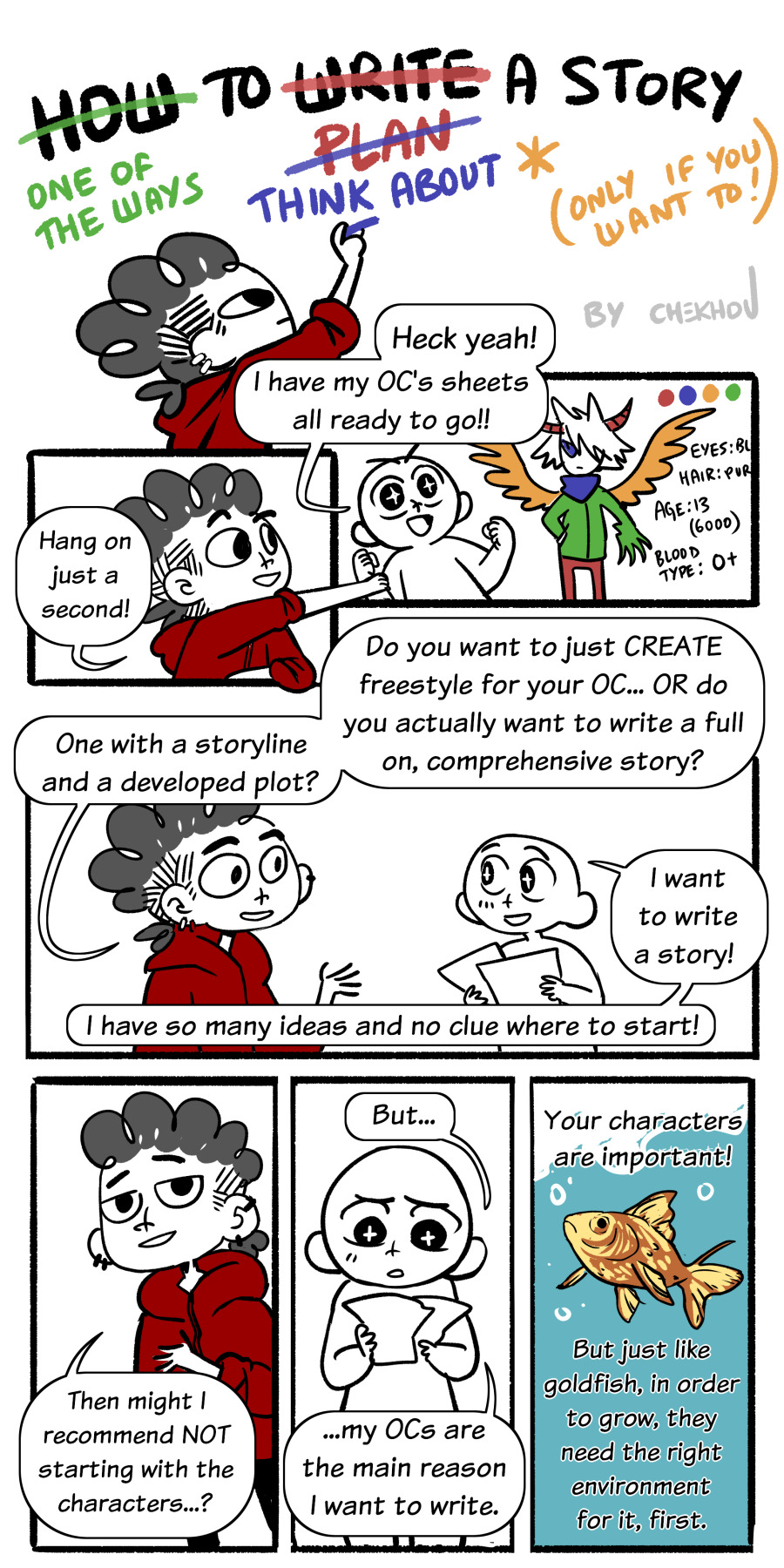
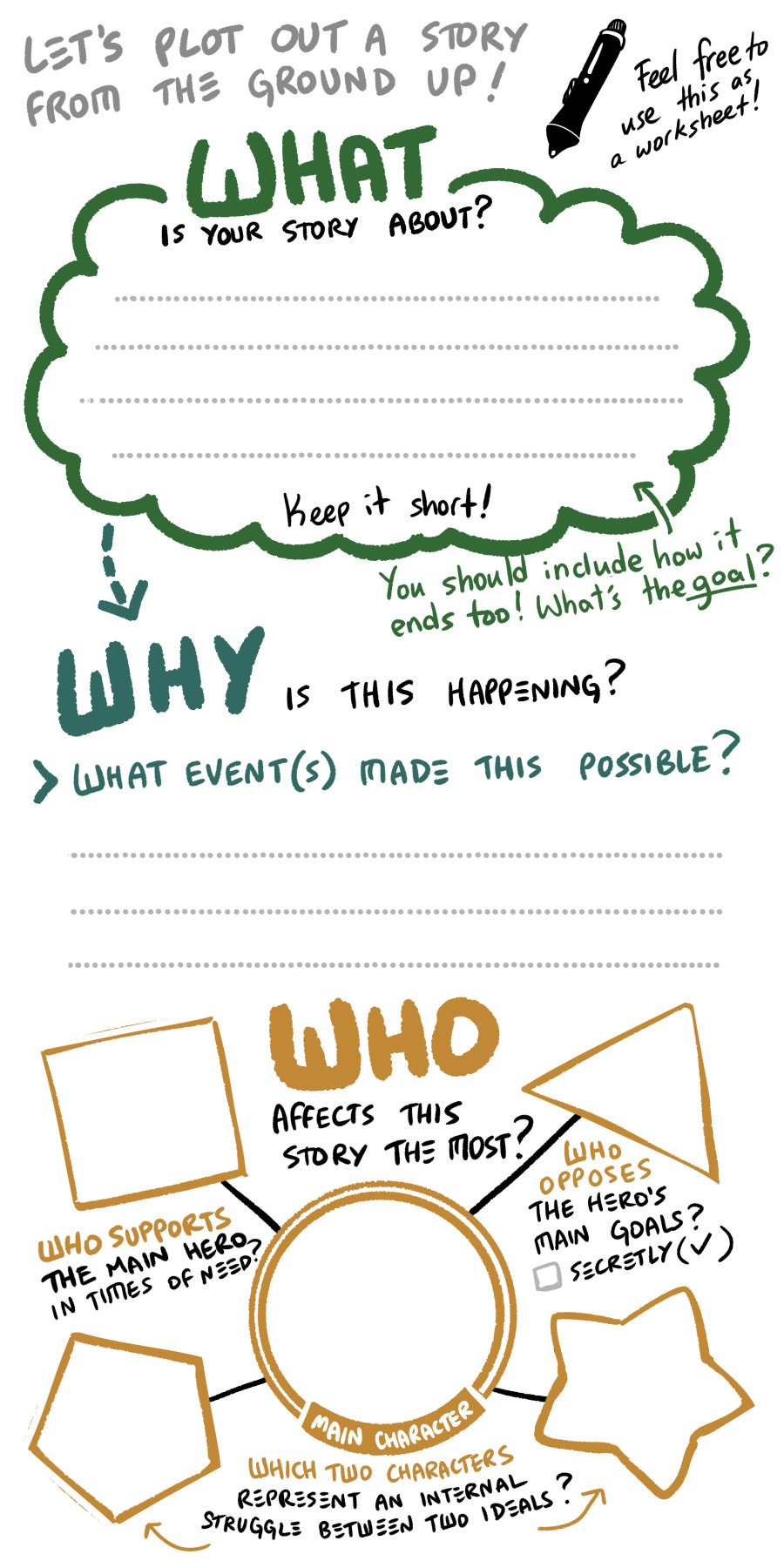
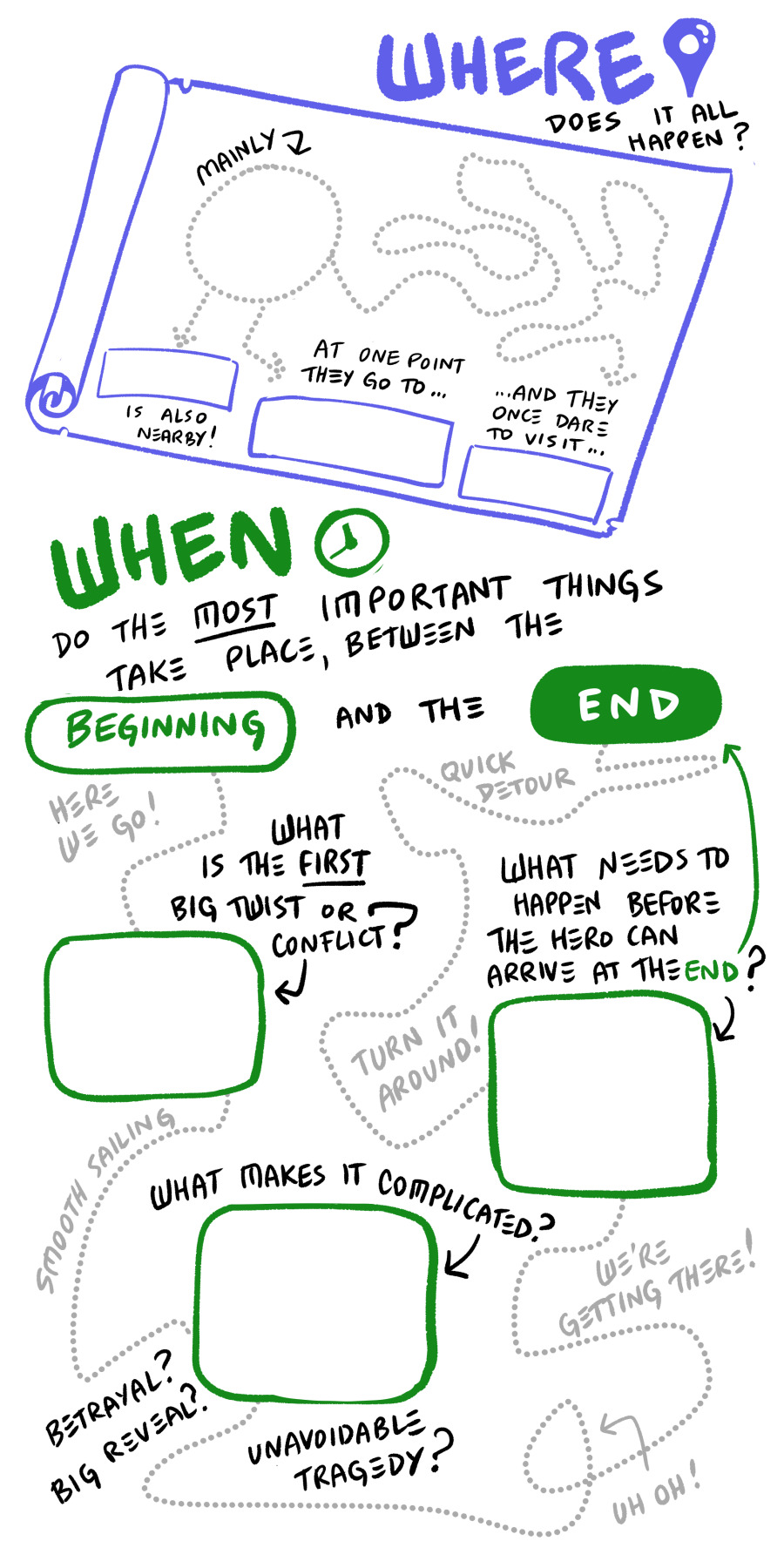
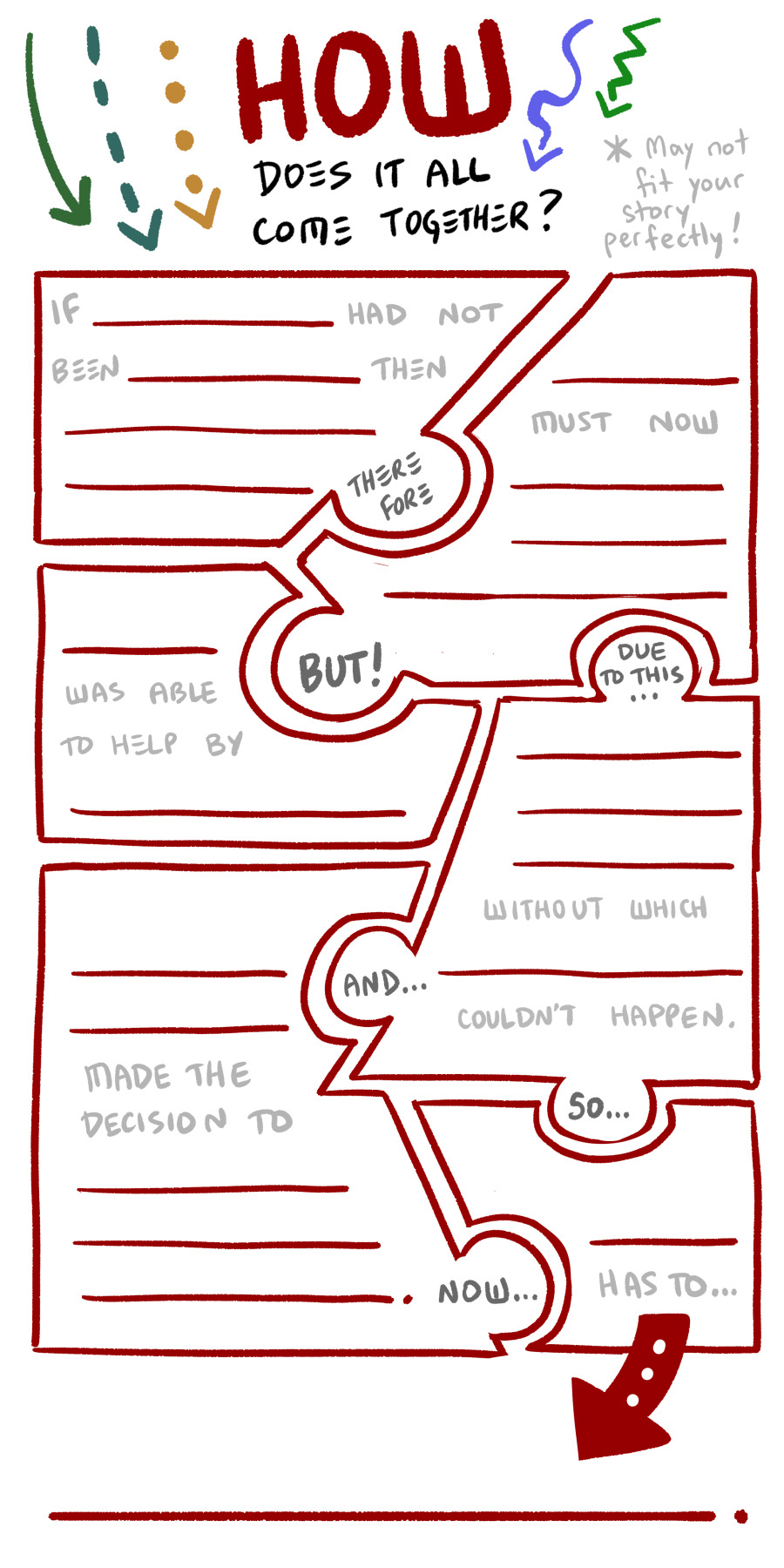
I've had this little idea in my head for a while now, so I decided to sit down and plot it out.
Disclaimer: This isn't meant to be some sort of One-Worksheet-Fits-All situation. This is meant to be a visual representation of some type of story planning you could be doing in order to develop a plot!
Lay down groundwork! (Backstory integral to the beginning of your story.) Build hinges. (Events that hinge on other events and fall down like dominoes) Suspend structures. (Withhold just enough information to make the reader curious, and keep them guessing.)
And hey, is this helps... maybe sit down and write a story! :)
31K notes
·
View notes
Text
you ever accidentally create a recurring theme in your writing. you start putting together an outline for something you’ve never written before and get partway through planning, rearrange the pieces, and go “GODDAMMIT THIS IS ABOUT GRIEF AGAIN”? because let me tell you,
78K notes
·
View notes
Note
Hey, so i'm working on my first WIP, and i wanted to ask about drafting. When can one consider their first draft done? Does it have to have the goal word count (ie; 100K), or would being about halfway there be considered a good enough first draft, that i can move on to the second and start editing?
Concluding each stage of the writing process
It's difficult to know when a phase of a writing project has concluded and you're ready to focus on a new objective as it's developing. I tend to approach my writing projects with a clear and uniform trajectory, regardless of how diverse my projects can be. This approach allows me to remain focused, thorough, and reassured that I am covering all my bases in an organized fashion. However, it also maintains space for me to be explorative and intuitive when necessary. In regards to word count, I don't think it's entirely relevant unless you're determined to adhere to strict genre conventions. Give your story the space it needs and not an extra inch.
(Optional) Zero Draft
In this phase, you're telling yourself the story. You're doing it quickly, messily, intuitively, and forgivingly. Explore every idea that glows in the dark for you, don't throw anything away or discount any possibility. Exhaust your imagination in this phase so that when you reach the first draft, you know you're making informed decisions.
First Draft
You're crafting the structure and core elements of the story. This is often the phase of discovery. You're becoming acquainted with your characters and how they interact, you're beginning to feel at home in the world and settings you've built, and you're seeing all sides of the conflict as it evolves. The goal here is settle on a beginning, middle, and end point, and by the end of this process you want to know your characters' motivations and relationships inside and out.
Second Draft
Go back quickly through the first draft and address any points where you got stuck, where you compromised for the sake of carrying on to the end, and fill in any apparent blanks. The first time you really iron something out, there will always be a few pesky creases. This is the time to find and flatten them.
Third Draft
This is where you question everything. Identify and scrutinize your decisions, dive into the "curtains are blue" discussions with yourself, and begin to tidy up things like grammar, clumsy dialogue, over-poured descriptions, and dubious vocabulary. Comb through each paragraph and be brutal, prioritizing clarity and intentionality of how you've told the story.
The Read Through
This is the point where I recommend doing three things:
Letting it rest away from you for 1-3 months so that you can return to it with a bit of unfamiliarity and new perspective.
Hand it off to a couple of trusted readers and give them ample time to read, digest, and craft some feedback
Reread the project once all the way through making no changes (although annotations are acceptable)
Fourth Draft
Finishing touches. Vigorously and meticulously scrub and scrape between the lines and imagine giving it to your worst enemy. If you can imagine any mean (but valid) things they could conceive of to say about it, this is the time to grapple with or fix those details.
Additional Resources
Guide to Drafting
Word Count/Productivity Tracker Spreadsheet
Balancing Detail & Development
Writing The First Chapter
Writing The Middle of Your Story
Powering Through The Zero-Draft Phase
Writing The Last Chapter
Chapter Length
Happy drafting,
x Kate
600 notes
·
View notes
Text
calling all authors!!
i have just stumbled upon the most beautiful public document i have ever laid eyes on. this also goes for anyone whose pastimes include any sort of character creation. may i present, the HOLY GRAIL:
https://www.fbiic.gov/public/2008/nov/Naming_practice_guide_UK_2006.pdf
this wonderful 88-page piece has step by step breakdowns of how names work in different cultures! i needed to know how to name a Muslim character it has already helped me SO MUCH and i’ve known about it for all of 15 minutes!! i am thoroughly amazed and i just needed to share with you guys
46K notes
·
View notes
Text
Have created a new novel-writing approach for myself that I am calling Very Gentle Writing. Very Gentle Writing is an approach for people who live nearly every waking second in self-castigation and actually need peaceful slowness to unleash their creativity.
Very Gentle Writing does not set staggering word count goals and then feel bad about it. No! Very Gentle Writing for me sets an extremely low word count and then feels magnificently productive when the low bar is exceeded (which is easy…it’s a low bar, I mean really low).
Very Gentle Writing is about saying hey yo maybe I just want to listen to a chill playlist for a while and feel one sentence spill out. Go me!
Very Gentle Writing is kind of about realizing I have a really limited amount of time to write in between work, and adulting, and taking care of a thousand life responsibilities, and trying to heal&deal from trauma in 2020. So I want that writing time to be….just…..nice.
Very Gentle Writing means I have a goal of enjoying every single time I sit down to write. Really. I use all the fun words first.
Very Gentle Writing came to me as an idea when I started to think about how as someone actively trying to recover from a lot of lifelong trauma, the usual word harder!! Work harder!! mantras in the world of “people doing hard things” didn’t motivate me at all, they only hurt me. I truly need a voice saying work less hard, personally.
34K notes
·
View notes
Note
Can you give some tips about writing the MC as a bad person, but still making they likeable? I feel like if I went ahead with the ideas I have, the character will be too detestable for anyone to root for, but if I diminish these characteristics the context of the story won't make sense.
MC Who is Bad but Likeable
If you want the reader to root for this character despite their bad behavior, you have to give them a sympathetic goal and show their humanity. The reader needs to see that despite the bad things this character does--which they do for a noble reason, even if that doesn't make it right--this character is redeemable. There is good in them even if the good is kept hidden. The following posts will help:
Guide: Attaching Reader to Morally Gray Protagonist Guide: Writing a Redemption Arc Antagonist with a Righteous Cause
•••••••••••••••••••••••••••••••••
I’ve been writing seriously for over 30 years and love to share what I’ve learned. Have a writing question? My inbox is always open!
LEARN MORE about WQA
SEE MY ask policies
VISIT MY Master List of Top Posts
COFFEE & FEEDBACK COMMISSIONS ko-fi.com/wqa
57 notes
·
View notes
Text
Ref Recs for Whump Writers
Violence: A Writer’s Guide: This is not about writing technique. It is an introduction to the world of violence. To the parts that people don’t understand. The parts that books and movies get wrong. Not just the mechanics, but how people who live in a violent world think and feel about what they do and what they see done.
Hurting Your Characters: HURTING YOUR CHARACTERS discusses the immediate effect of trauma on the body, its physiologic response, including the types of nerve fibers and the sensations they convey, and how injuries feel to the character. This book also presents a simplified overview of the expected recovery times for the injuries discussed in young, otherwise healthy individuals.
Body Trauma: A writer’s guide to wounds and injuries. Body Trauma explains what happens to body organs and bones maimed by accident or intent and the small window of opportunity for emergency treatment. Research what happens in a hospital operating room and the personnel who initiate treatment. Use these facts to bring added realism to your stories and novels.
10 B.S. Medical Tropes that Need to Die TODAY…and What to Do Instead: Written by a paramedic and writer with a decade of experience, 10 BS Medical Tropes covers exactly that: clichéd and inaccurate tropes that not only ruin books, they have the potential to hurt real people in the real world.
Maim Your Characters: How Injuries Work in Fiction: Increase Realism. Raise the Stakes. Tell Better Stories. Maim Your Characters is the definitive guide to using wounds and injuries to their greatest effect in your story. Learn not only the six critical parts of an injury plot, but more importantly, how to make sure that the injury you’re inflicting matters.
Blood on the Page: This handy resource is a must-have guide for writers whose characters live on the edge of danger. If you like easy-to-follow tools, expert opinions from someone with firsthand knowledge, and you don’t mind a bit of fictional bodily harm, then you’ll love Samantha Keel’s invaluable handbook
28K notes
·
View notes

